Next article:
BLOG: Hugo White interview
Box Office
Social
Address
Half Moon Theatre
43 White Horse Road
London E1 0ND
Registration
If you are contacting us to add your child to the Youth Theatre waiting list, please use the online registration form.
Blog

Laura Dockrill is an award-winning children’s author and illustrator whose books include Angry Cookie, Big Bones, My Mum’s Growing Down and the hugely popular five-book Darcy Burdock series. Dust, her latest play for young people written with musician Hugo White (The Maccabees), streams online from Saturday 6 to Friday 19 February 2021 as part of a digital tour. We caught up with Laura to find out more about the show, the inspiration for the story, the challenges of writing a play for young people and why it is important to create work specifically for children.
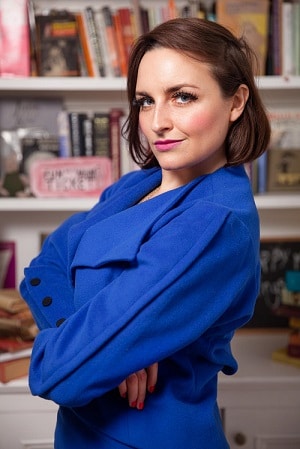
Tell us a little about Dust. What is the show about?
Dust is a show about memory, loss and love. It’s about identity and how to make peace with yourself and your past. And, of course, family too. How you can make and find a family anywhere, with anybody, so long as there is warmth and kindness.
What was the inspiration for the story?
Titch presented herself to me out of the blue. I knew I wanted to write a bold little girl that was ‘fearless’ and defensive. I loved Tracy Beaker and all the Jacqueline Wilson books growing up so this was a chance to use that inspiration.
The Half Moon suggested a two-hander to me, so choosing a character to oppose Titch was really fun; then Nelly rolled in and made the script light and amusing. And the house! A few years back I went to America to do some writing and landed in a giant pink mansion house – I always knew the house would find itself into a piece of writing and here it is!
Why do the issues in Dust particularly resonate with you?
My mum was adopted, so I have always had an interest in that; we often joke that my mum’s real parents were a shark and a T-Rex because of her wild and strong personality. I have a toddler myself, so the idea of motherhood is very interesting to me and something I have recently been exploring.
I visit a lot of schools and meet a lot of young people that come from different backgrounds, places of trauma or disadvantage. It always strikes me how time and love can mend that, through building relationships, history and unlocking the past. I find children very resilient and robust – it’s us adults that are the delicate ones!
You are an award-winning children’s author, what are the challenges of writing a play for young people?
Kids can smell it out if you aren’t being truthful to yourself, so you have to be very genuine, honest and wear your heart on your sleeve in order for a young person to ‘go’ with your story and believe in it. Of course, I am battling with attention spans – the distractions of games consoles, cheese and onion crisps and bogey picking – so I’ve tried to keep the language rhythmic and upbeat whilst anchoring to a story with heart. If I want audience members to feel something, I need to give them something of myself.
“I’ve tried to keep the language rhythmic and upbeat whilst anchoring to a story with heart. If I want audience members to feel something, I need to give them something of myself.”
How does your writing process differ between writing a book and a play?
It’s exactly the same – just my sister or Hugo has to play the other part. Plus a word on a page has space to live and spread, whereas on stage it hangs like dirty laundry if left too long!
Why do you think it’s important to create work specifically for young people?
Storytelling is what connects us and unites us; it reminds us that we are not alone. Often the things we believe are the most personal and what is actually the most universal.
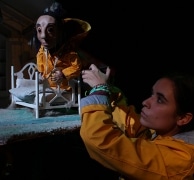
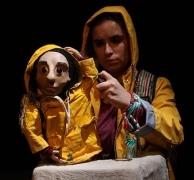
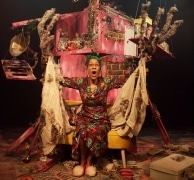
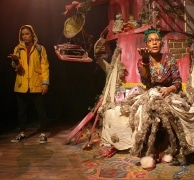
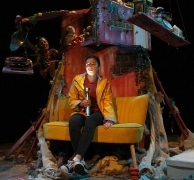
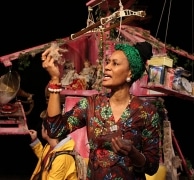
Theatre is a collaborative process. How are you feeling about seeing your play brought to life with other creative elements?
I cannot wait! In a book I have to do all the hard work. I have to wake my characters up and brush their teeth and feed them and make them talk – in a play an actor can do all that for me and I can sit back with a tub of ice cream and enjoy it (I hope!).
How do you want audiences to feel during / after the show?
It would be nice if the audience enjoys the language and music, finds heart and warmth in the story and wants the best for Titch. Also the importance of listening and talking to our elders, finding out about their pasts and history. It’s difficult to imagine our own parents and grandparents as children, but they once were – maybe we have more in common than we think?
Describe Dust in three words.
Magic. Memories. Home.
And finally, why should people watch Dust?
To see magic. To have your heart warmed. To believe in hope.
READ OUR INTERVIEW WITH HUGO WHITE
Dust streams online from Saturday 6 to Friday 19 February 2021 as part of a digital tour.
Dust is a co-production with Z-arts
Join our mailing list
Don't miss out on the latest shows, news and events updates from Half Moon - sign up to our newsletter.
Support Us
Help us to deliver our vital programme of work and enable us to help young people achieve their potential through the power of the arts.